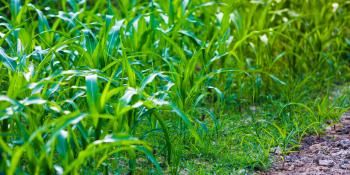It takes a village to build climate-resilience
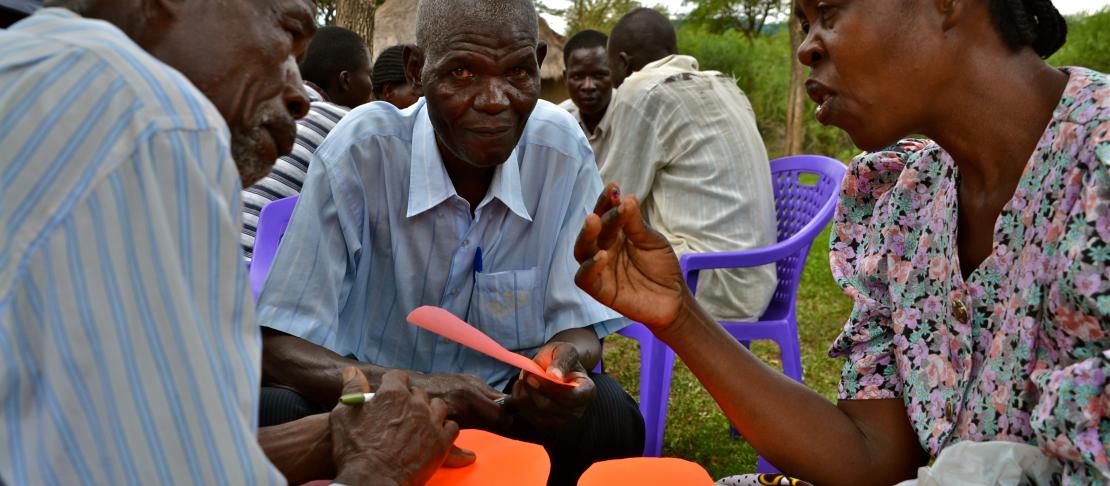
If rural villagers pulled together all available resources while working hard towards a common goal, would that lead to a more prosperous and climate-resilient tomorrow? Well, maybe, but first they would need to come together to see which skills are there. This is exactly what we did at a recent participatory session, as we talked about how the Lower Kamula village in Western Kenya, together, as a group, can push for community development.
This particular group session has a lot of potential to spark important discussions around community development. It encourages participants to think about their own strengths, what the village has in terms of values and resources, and what it needs in order to prosper.
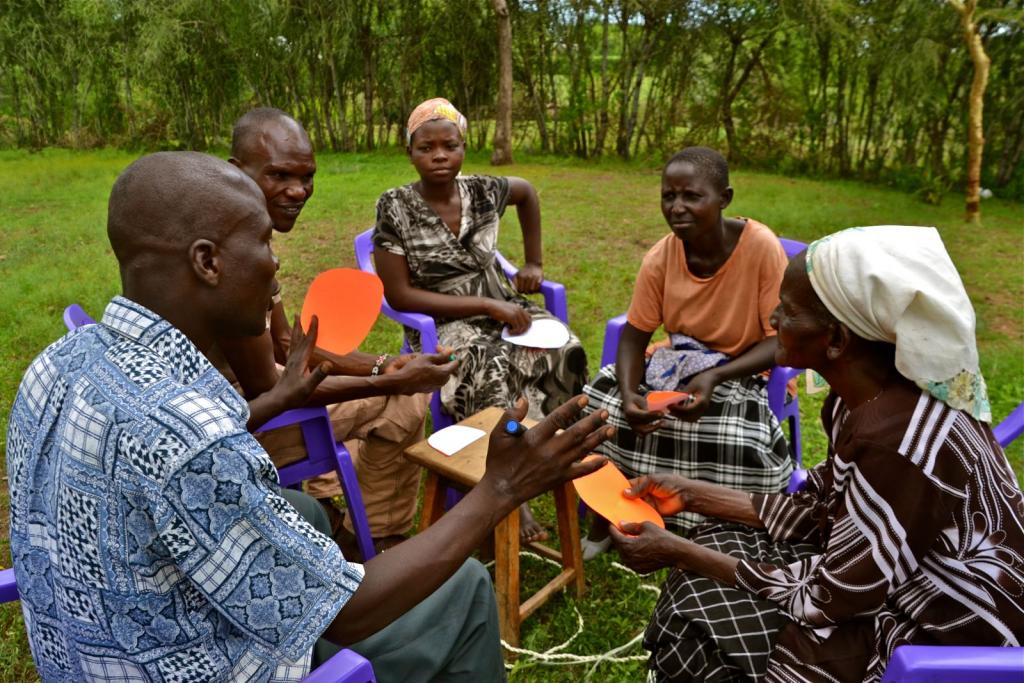
Joint discussions around what the community has and needs in order to become climate-resilient and better off. Photo: C.Schubert (CCAFS)
Upcoming research guide explores community resources
The “Socially Inclusive Participatory Research and Development for Climate Change and Food Security Guide" will be released later this year.
Led by CCAFS, it is the product of multiple partners, including CARE, ICRAF, WeEffect and the Food and Agriculture Organization of the United Nations (FAO). Tested in both Kenya and Ghana, it builds on a previous gender, agriculture and climate research manual released in 2012 by FAO and CCAFS.
This approach, which helps work out how to use community strengths and capacities, is one of many approaches being developed and documented for a forthcoming guide on participatory research for climate change and food security.
The new guide will assist agriculture and climate change researchers and development professionals to more effectively address gender and social aspects in their work.
Its participatory modules have been trialled and tested in Western Kenya by a team from the CGIAR Research Program on Climate Change, Agriculture and Food Security (CCAFS) and organised by the World Agroforestry Centre (ICRAF), while in Ghana the team is supported by CARE.
The guide’s ambitious goals are to re-imagine what a more equitable exchange between participants and researchers could look like, making the testing a crucial part of the process.
Learn more: Coming soon: a gender and climate change manual made by many
What is important to you and your community?
Everyone was asked to sit together in groups and write down what their community needs were, as well as what is important both to them and the community as a whole. During many lively discussions later, we saw that people wanted their community to get a local college, a borehole, reduce the gap between rich and poor, access to better loans to boost agriculture production, increase tree cover and start more self-help groups.
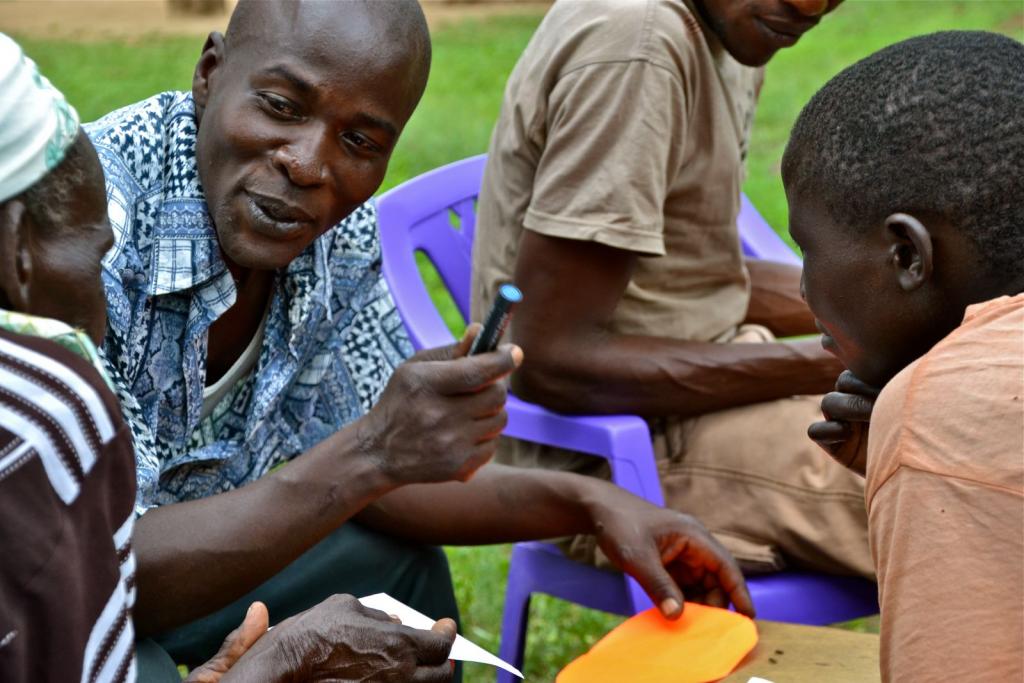
Discussing community goals and resources in the Lower Kamula village in Western Kenya. Photo: C.schubert (CCAFS)
Aiming for the low hanging fruit first
Some of the community goals that emerged were ambitious and would require a lot of time and resources. The idea is to help the community prioritise the more attainable ones first, on the community ‘goal-tree’, and then work their way up, slowly increasing chances to get to the next level or goal.
So which goals were the “low-hanging fruits” for the Lower Kamula village?
“Getting more people organised in self-help groups, and getting one organisation as the umbrella group, which can channel funding and opportunities down to the different groups would be a good first step,” said Jack Onyango, a farmer and village elder.
We have self-help groups but they are not organised and not working together, which is a problem.”
“We can organise table banking, and getting educated people to teach others,” said Perez Mula a woman farmer in this session. “We can also teach each other on how to live a healthy life style.”
A borehole, research centre, a market and a college were all seen as the harder-to-obtain goals. For those, the group needs to identify what strengths they have.
"We have love and many hard workers"
Remmus, a young farmer from the community, talked about the values that are already in the community: “People are hard-working, working in their fields and around the households everyday, the village is unified and peaceful.”
“We love each other", added Dorothy, one of the elderly women farmers. "This is a good start, as a broken community will not be able to achieve anything."
“Many of us are also literate, we can write proposals to ask the country or village chiefs about getting a market around here that would allow us to get a better income. As of now, we don’t have anywhere to sell our vegetables and tomatoes”, said Joseph, a village elder.
Watch a video with Remmus
Coming together and reaching out to development organisations, writing proposals, talking to chiefs and country heads, and educating each other on farming and other income-generating activities were all proposed ideas on how to move towards the more ‘harder-to-reach’ goals.
As the clouds manage to squeeze out some drops, scaring us enough to move inside, the discussions intensified. Issues of safety, education, and how to help each other adapt to an increasinly variable weather were discussed, with people getting very serious about the need to change some of the structures in the community. Many were disgruntled, we learned afterwards, about how things had been dealt with up to now, with some of the elders wanting to control too much in the community and therefore preventing further change.
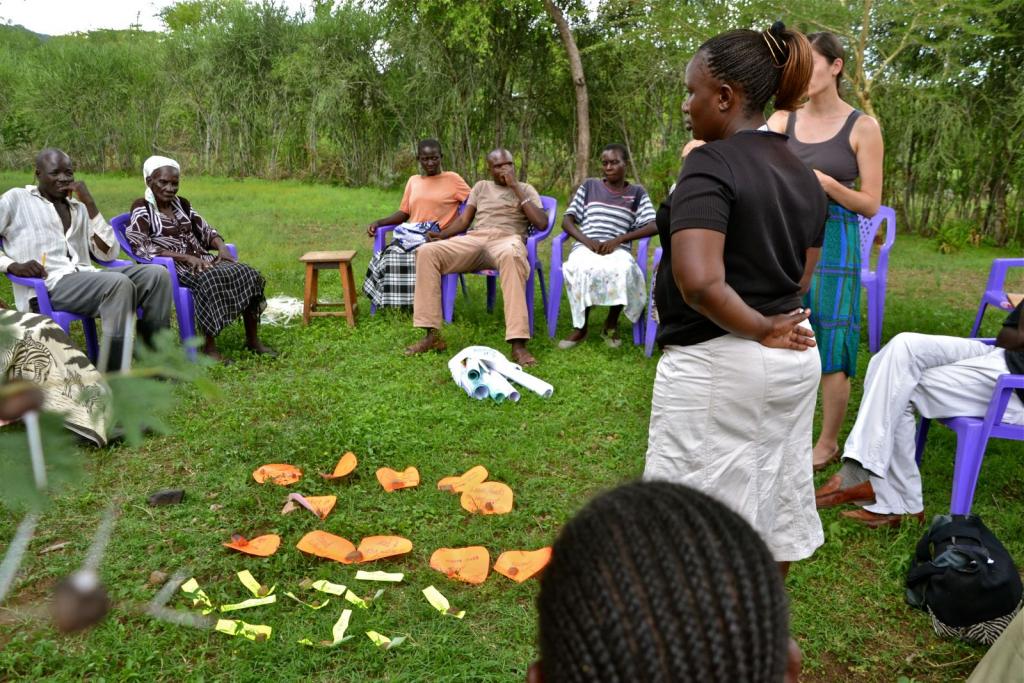
The "Goal-tree" all laid out on the ground for further discussions on how to reach the harder, more ambitious goals. Photo: C.Schubert (CCAFS).
Before we left, Jack Onyango told us that as a village elder he has a lot of responsibility, and getting some new input and ways to view the problems he sees everyday are always appreciated. He said he had learned a lot from today’s discussions with his neighbours and friends.
Hopefully the villagers of Lower Kamula will continue to have these much needed discussions and be guided by the common goals for the community. With peace and love already there, much can be achieved with some hard work, a plan and a unified front. This is also what the session aimed to achieve; inspire further community discussions related to climate change adaptation and resilience building, equality and local development.
Jack Onyango being interviewed after the session:
This work forms a crucial linkage between more "traditional" scientific agricultural research, i.e. knowledge production and the work we do under Theme Linking Knowledge with Action, which is searching for ways to create change on the community level through communication, participation and partnerships.
Read additional stories from our participatory action research activities in Western Kenya:
- What does ‘female empowerment’ mean to women in Kenya?
- Uncovering gender perceptions and beliefs in the hunt for climate information
This story was put together by Cecilia Schubert, Communications Officer for CCAFS Gender and Linking Knowledge to Action Themes. She joined the testing of the manual in Western Kenya.
This session might come to be changed depending on how the testing in Ghana and results from Western Kenya.


